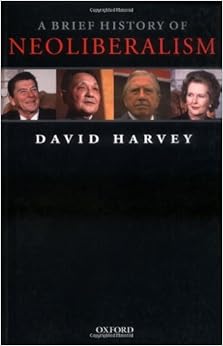Many often throw around the term "neoliberalism," to refer to recent political, economic and historical events, but what is it, exactly? David Harvey attempts to answer this question in 2005's A Brief History of Neoliberalism.
Harvey opens the book with the definition: "Neoliberalism is in the first instance a theory of political economic practices that proposes that human well-being can best be advanced by liberating individual entrepreneurial freedoms and skills within an institutional framework characterized by strong private property rights, free markets and free trade." (2) This goes hand in hand with the neoliberal state, which Harvey says is "a state apparatus whose fundamental mission [is] to facilitate the conditions for profitable capital accumulation on the part of both domestic and foreign capital." (7) Harvey writes that neoliberalism has become "hegemonic as a mode of discourse." (3)
Harvey identifies some notable events in the advent of neoliberalism as:
- The 1971 Lewis Powell Memo (43)
- The 1971 dismantling of the Bretton Woods system (12)
- Policy changes in Chile after the 1973 Pinochet coup ("The first experiment with neoliberal state formation" (7))
- The 1970s New York City fiscal crisis ("a coup by the financial institutions against... New York City" (45))
- The 1979 Volker shock ("a necessary but not sufficient condition for neoliberalization" (24)) when the Carter-appointed chairman of the Fed hiked interest rates dramatically, curtailing inflation without regard to employment
- The foundation of think tanks / takeover of economics departments to promote neoliberal ideology (54-7)
- The union-busting, etc. policies of Thatcher and Reagan
- "Structural adjustment" policies of the IMF (29)
- Deng Xiaoping's 1978 announcement of Chinese economic reforms (120)
Even the neoliberal theory, as embodied in such documents as the missives of the Mont Pelerin Society, has its contradictions: its distrust of state power vs its advocacy of a strong and coercive state; its scientific rigor vs its political commitments to freedom and defining corporations as individuals in legal terms (21). In practice, neoliberalism provides further contradictions with the theory: squeamishness over democracy, monopoly power, collective action and market failure (66-8); favoritism of a "good investment climate" and preferring financial stability to population welfare; forcing international state borrowers to pay back bad loans (70-74); its tendency towards authoritarianism and financial moral hazard (79-81); etc.
Such contradictions prompt Harvey to declare the neoliberal state "either a transitional or unstable political form." (79) He sees the increasing neoliberalization of authoritarian states (China) and increasing authoritarianism of neoliberal states (US, UK) as converging to the same type of regime, a neoconservative one that provides "order as an answer to the chaos of individual interests" and "overweening morality as the necessary social glue to keep the body politic secure in the face of external and internal dangers." (82) But Harvey warns against this development, advising, "To avoid catastrophic outcomes therefore requires rejection of the neoconservative solution to the contradictions of neoliberalism." (86)
The neoliberal state has a paradoxical relationship with nationalism. On the one hand, "the umbilical cord that tied together state and nation under embedded liberalism had to be cut if neoliberalism was to flourish." (84) On the other hand, the state needs to mobilize nationalism to promote itself in a competitive global marketplace. But cultivating this nationalism can also pose a danger to neoliberal interests at times, either in the form of anti-immigrant movements or national movements against neoliberal leaders. (85)
Chapter four details case studies of various countries' experience with neoliberalism -- Harvey highlights Mexico, Argentina, South Korea and Sweden. Chapter five deals with the case of China.
Evaluating the success of neoliberalism according to its stated aims, Harvey finds "its actual record turns out to be nothing short of dismal." (154) However, policy has not changed because neoliberalism "has been a huge success from the standpoint of the upper classes." (156) That is because "The main substantive achievement of neoliberalism... has been to redistribute, rather than to generate, wealth and income." (159) Harvey believes the "accumulation by dispossession" regime that neoliberalism has brought about utilizes techniques of privatization and commodification, financialization, the management and manipulation of crises and state redistribution to achieve its ends. (160-5)
In the final chapter Harvey ponders the end of neoliberalism, warning that "regimes of accumulation rarely if ever dissolve peacefully." (189) "The consolidation of neoconservative authoritarianism," Harvey opines, "emerges as one potential answer." (195) As for alternatives, and in what can be read as a possible predictor of Occupy Wall Street, Harvey notes, "there is no reason to rule out the resurgence of popular social democratic or even populist anti-neoliberal politics within the US in future years." (199) But he admits in any event, "There is no proletarian field of utopian Marxian fantasy to which we can retire." (202)
Robbert Brenner has a review and critique of Harvey's thinking in "What Is, and What Is Not, Imperialism?" which offers a much more exhaustive analysis.
Thanks to Aaron Benanav for conversations regarding this book.

No comments:
Post a Comment